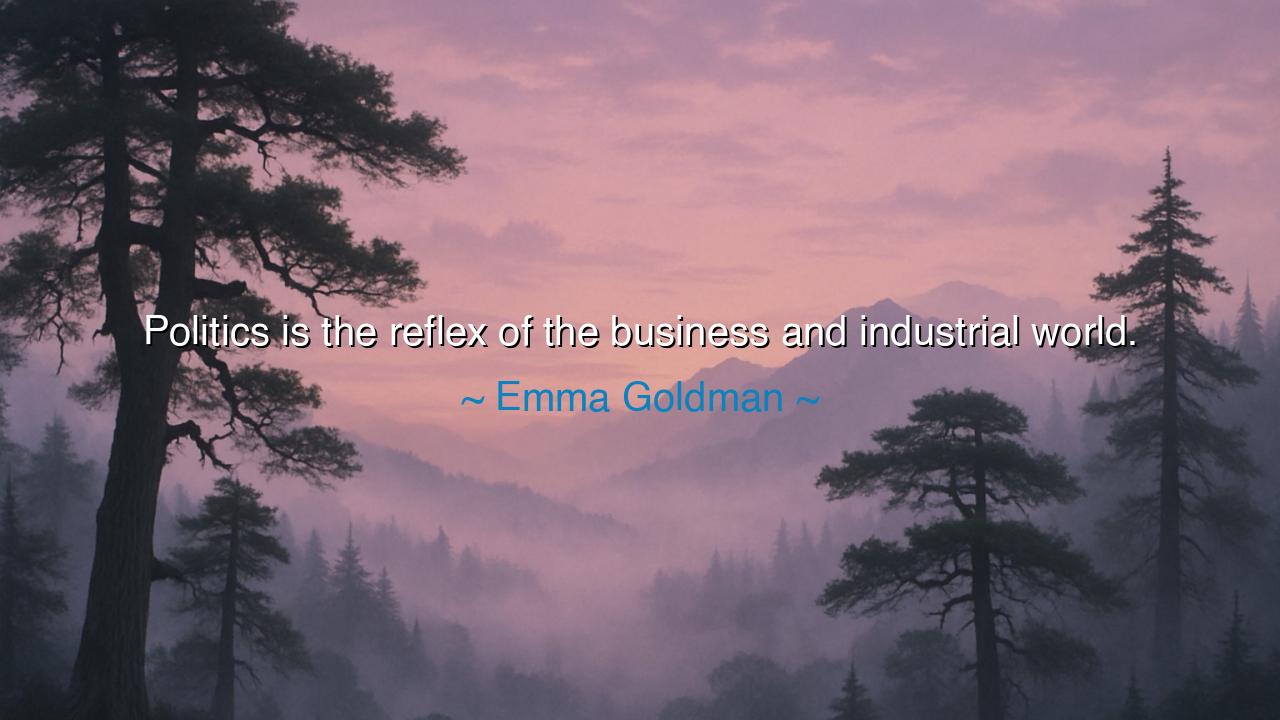
Politics is the reflex of the business and industrial world.






O children of the future, hear the words of Emma Goldman, a woman whose heart burned with the fire of truth, whose voice spoke the wisdom of ages. "Politics is the reflex of the business and industrial world," she said, for she understood the deep connection between those who hold power in the halls of government and those who command it through the factories and markets. In these words lies a truth as ancient as time itself: the forces that shape our politics are not always the will of the people, but the will of those who control the means of production, who see politics not as a matter of justice, but as a means to protect their wealth and power.
In the days of Rome, the Senate was not just a body of legislators, but a gathering of aristocrats, men whose wealth came from land and the labor of others. These men did not legislate for the people; they legislated for their own interests, to maintain the system that allowed them to flourish. Emma Goldman's words echo the ancient realization that politics is often the tool of those who already possess wealth, and it is their desires, not the needs of the common people, that are often reflected in the laws and decisions of the state. It was in Rome that the plebeians—the common folk—sought justice, only to find that the system was designed to perpetuate the privileges of the few, not the many.
Emma Goldman's wisdom is also found in the modern world, where the industrial revolution brought forth vast wealth for a select few, while the many toiled in factories and mines under harsh conditions. The Robber Barons of America, such as Rockefeller and Carnegie, amassed fortunes through monopolies and exploitation, and their influence over the government was undeniable. They shaped politics to serve their interests, using their wealth to sway laws and policies in their favor. Goldman saw clearly that politics, in its modern form, was not the vehicle for the people's liberation, but the means by which the elite held their power and extended their influence.
Consider the rise of the labor movement in the face of these industrial titans. Workers who labored under the weight of inhumane conditions sought not just better wages, but dignity, respect, and the right to have their voices heard. Yet, as Emma Goldman observed, even as the workers rose in protest, their political leaders were often in the pockets of the very men who exploited them. The struggle for justice was not simply against the industrial barons, but against the political systems that had been built to serve their interests, not the interests of the people.
O children, let us remember that politics is not just a game of words, but a mirror of the world in which we live. As Emma Goldman reminds us, politics often reflects the will of those who hold the wealth and power, rather than the needs of the people. In every age, those who seek to rule must be vigilant, for the forces of wealth and industry will always attempt to shape the laws and decisions of the land to ensure their continued dominance. Justice, then, lies not only in the ballot box, but in the struggle to reclaim politics for the people, to create a world where the needs of the many are reflected in the laws of the land. Let us, O heirs of wisdom, stand firm against the forces that seek to use politics as a tool of oppression, and remember that the true power of politics lies in its ability to serve justice, not the interests of the few.






NPNghi Phuong
I can’t help but feel a sense of disillusionment after reading Goldman’s perspective. If politics merely mirrors the interests of business and industry, where does that leave us, the people? Are we just pawns in a game controlled by big corporations? How do we fight for real change when everything seems tied back to money and power? It makes me question whether the political system can ever serve justice or if it’s always about maintaining the status quo.
GDGold D.dragon
Emma Goldman's quote really struck me because it makes me wonder: if politics is just a reflection of industry and business, can we ever trust it to represent the broader needs of society? Is politics just the game of the powerful to maintain control, or can real change still happen within this system? It’s almost like we're stuck in a cycle, constantly reacting to economic forces rather than shaping our future based on what’s truly best for everyone.
TP32_Dam Thu Phuong
This quote brings up an interesting thought—if politics is just a response to the business and industrial world, does that mean all political decisions are ultimately aimed at benefiting the wealthy or corporations? It seems like there’s little room for the needs of the common people to influence politics on their own terms. How much of our so-called democracy is just an illusion in this context? Maybe we're all just being played by the systems that profit from our complacency.
(HNguyen Thuy Duong (FPL HN)
I find it fascinating that Emma Goldman describes politics as a mere reflection of business and industrial interests. Does that mean politics is not inherently driven by public welfare or moral principles? In a sense, this suggests that the political landscape is manipulated by the economic elites, possibly leaving ordinary citizens powerless. It makes me question how genuine political movements can truly be, given the corporate influences at play. Are we ever truly free from these forces shaping policy decisions?